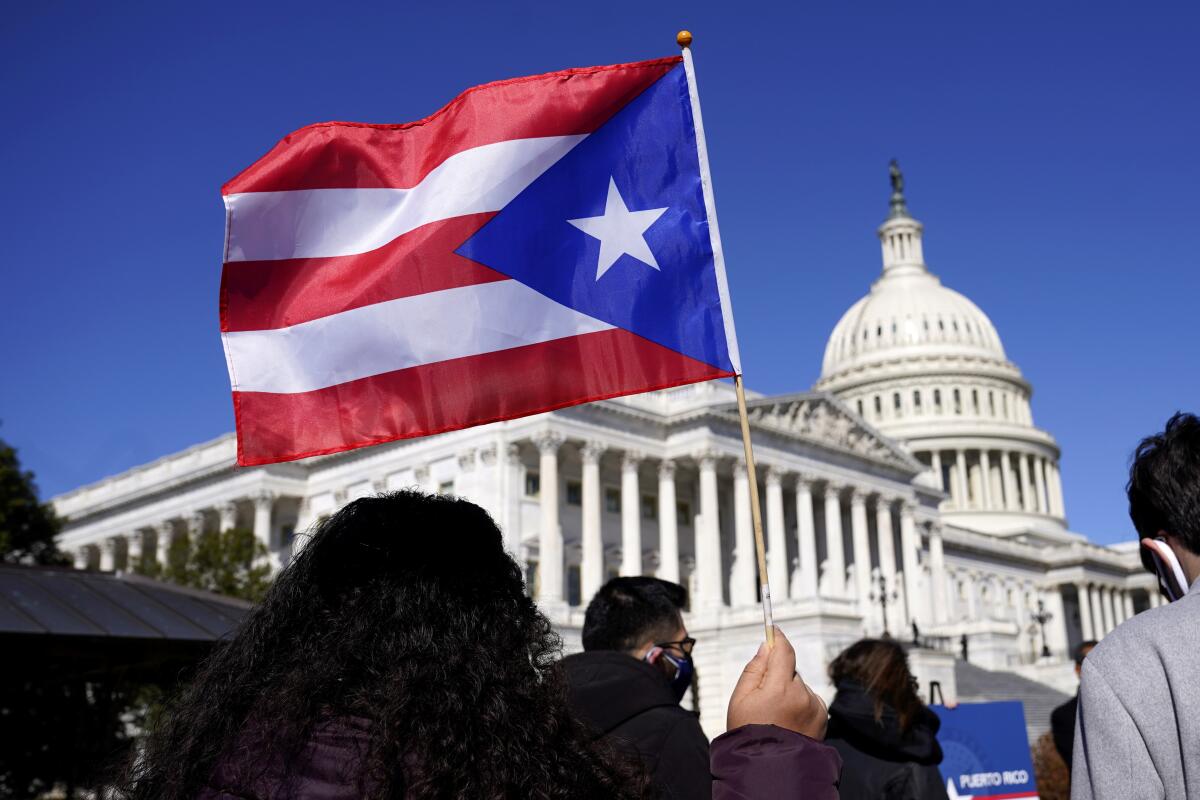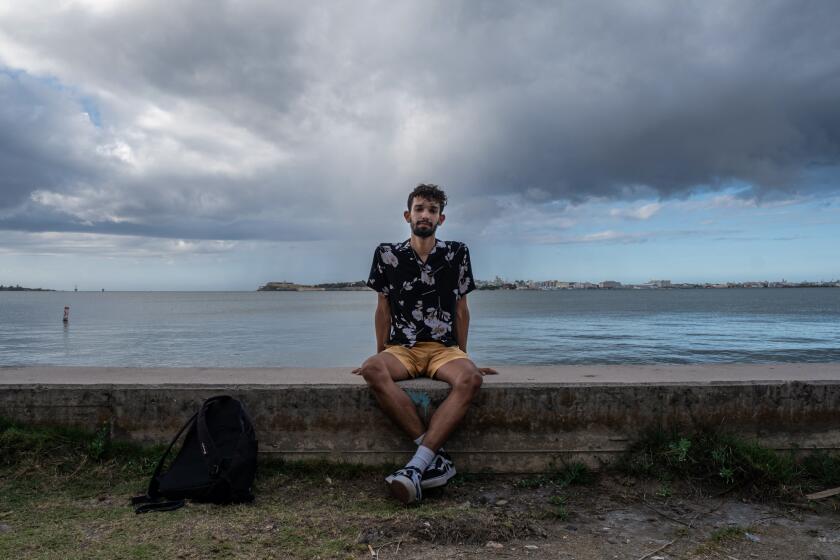Puerto Rico’s future status should not be a pawn in political gameplay

- Share via
For Democrats who want to stop the right-wing assault on democracy, statehood for Puerto Rico can seem like a simple fix — one so enticing it may be easy to forget the will of the Puerto Rican people.
As a Boricua journalist who covers the insurrectionist right and comes from a pro-statehood family, I’d love to see Puerto Rico become a state. But Puerto Rico’s fate is not for any person stateside to dictate.
Congress is considering two bills that aim to change Puerto Rico’s status as a commonwealth, which has enabled decades of economic predation and devastation compounded by COVID and natural disasters. Recent island-wide blackouts are just the latest example of neglect. The bills are the Puerto Rico Statehood Admission Act and the Puerto Rico Self-Determination Act. Only the latter, co-sponsored by New York Reps. Nydia Velázquez and Alexandria Ocasio-Cortez, is truly democratic.
Opinion Columnist
Jean Guerrero
Jean Guerrero is the author, most recently, of “Hatemonger: Stephen Miller, Donald Trump and the White Nationalist Agenda.”
The self-determination bill would create a “status convention” consisting of delegates elected by Puerto Ricans. The delegates would debate and define the implications of various status options — such as statehood, independence and free association (where a sovereign Puerto Rico would retain U.S. economic assistance and transfer agreed-upon authorities to the U.S., such as military defense) — in consultation with a congressional negotiating commission. The bill would fund strong education efforts on this issue and Puerto Ricans would then vote on the options in a referendum. The results would be binding on Congress. Ocasio-Cortez says the bill is “status agnostic.”
The statehood admission bill, on the other hand, aims to impose a status based on a nonbinding referendum from November 2020, when about 53% of Puerto Rican voters answered “yes” to the question: “Should Puerto Rico be immediately admitted into the Union as a state?” That referendum, however, has gotten valid criticism for excluding other status options and for low voter turnout amid political disillusionment. Several previous referendums have been flawed and inconclusive.
Puerto Ricans continue to lack clarity on key questions about statehood. For example, would Spanish remain the language of courts and schools? What new taxes would they have to pay, and starting when? What would happen to Puerto Rico’s national Olympic team? They have questions about what independence would look like. Would Puerto Ricans keep their U.S. citizenship, as some experts argue they could?
For those who see Puerto Rico as a pawn, such details are afterthoughts.
“Puerto Ricans should not be used as a political chip for cleaning up a mess they didn’t create,” Erica González, director of Power 4 Puerto Rico, a coalition of Puerto Ricans who support decolonization in Puerto Rico, told me. “It’s not simply a matter of stitching a Caribbean country into the United States. People have to decolonize their attitudes.”
A century ago, in Balzac vs. Porto Rico, the Supreme Court decided that Puerto Ricans — despite being U.S. citizens — lack the full and equal rights of citizens living in the 50 states and the District of Columbia. It was one of the Insular Cases that restricted the constitutional rights for residents of certain territories who were deemed “alien races.” The constitutionality of those Insular Cases is being debated in Congress.
Puerto Rican Kemuel Delgado hates having ‘one foot in and one foot out’ of America. But race wasn’t on his mind when he began pushing for statehood.
For generations, colonial elites profited from the archipelago at the expense of its people. For Puerto Ricans who’ve long been treated as second-class citizens, it’s not hard to imagine the U.S. treating Puerto Rico as a second-class state as well. Only the self-determination bill ensures a voice for the islands’ historically most marginalized communities such as Afro Puerto Ricans, whose concerns could be heard and addressed in the negotiations phase.
Members of Congress from California could play an important role in providing Puerto Ricans with a full say in their future, because they make up 20% of the House Committee on Natural Resources, which oversees Puerto Rico. More than 200,000 Puerto Ricans live in California, and many have been reaching out to members of the committee to share their thoughts.
Nicole Hernandez, co-founder of the Los Angeles-based Puerto Ricans in Action, told me her primary concern is, “How do we make a more livable world for Puerto Ricans and center the most vulnerable?”
Ricardo Ramírez, an Orange County volunteer for Puerto Ricans in Action, said he’s hoping to persuade progressive politicians who support equality and inclusion to throw their weight behind self-determination.
The Puerto Rico Statehood Admission Act, by contrast, is championed by right-wing interests, such as ousted and disgraced former Puerto Rico Gov. Ricardo Rosselló; Resident Commissioner Jenniffer González-Colón, who was a member of Latinos for Trump; the Fonalledas, a wealthy family in Puerto Rico that donates to Republican candidates; and José Fuentes Agostini, a former Trump campaign advisor who heads the Puerto Rico Statehood Council.
“The lobbying power of the Puerto Rico statehood movement is incredible,” Charles Venator, an associate professor of political science at University of Connecticut and author of “Hostages of Empire,” told me. Yet Puerto Rico status bills, which have been introduced more than 100 times over the years, have floundered. The latest ones will also likely stall in the Senate since most Republicans fear Puerto Rico statehood would tip the balance of power in favor of Democrats.
Whether the self-determination option — supported by dozens of organizations, Democratic senators and even Republican Sens. Roger Wicker and Richard M. Burr — can win support in the Senate is unclear.
José Bernardo Márquez, a pro-statehood member of Puerto Rico’s House of Representatives, told me self-determination is “the most just and democratic option.” President Biden, he says, needs to deliver on his campaign promises for Puerto Ricans, including self-determination, because “very little of those promises have been kept except for those related to the flow of emergency funds and parity in access to programs.”
The office of House Majority Leader Steny H. Hoyer (D-Md.) has been exploring a potential compromise between proponents of the two bills. But the consensus should be hammered out by Puerto Ricans, not House Democrats.
If Democrats truly believe in dignity and equality for Puerto Ricans, it’s time to support their right to self-determination.
More to Read
A cure for the common opinion
Get thought-provoking perspectives with our weekly newsletter.
You may occasionally receive promotional content from the Los Angeles Times.













